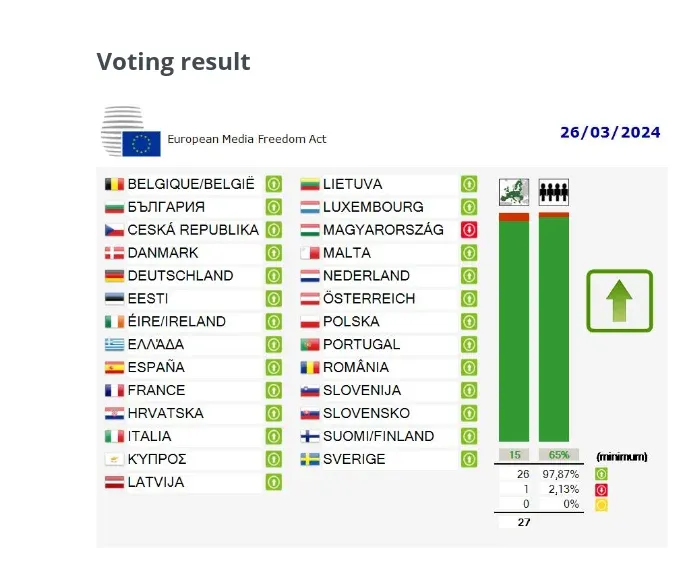On Tuesday, the Council of the European Union adopted the EU's regulation on media freedom, the body said in a statement. According to the result posted on the meeting's webcast page, the legislation was formally approved by 26 of the 27 member states at Tuesday's Council meeting of agriculture ministers, with only the Hungarian representative voting against.

The Hungarian government was also the only one to reject the preliminary agreement reached with the other legislator, the European Parliament, in January. The EP adopted the legislation weeks ago, so now it only needs to be signed and published in the EU's Official Journal before it enters into force 20 days later, the Council statement said.
During the debate on the proposal in the EP, Andrea Bocskor from the delegation of Hungary’s bigger governing party said that this is actually Brussels' censorship law, and that the draft was another attempt to interfere in the sovereignty of member states, "aiming to establish total control over the media. This is clearly evident from the fact that the regulation lays down a uniform set of rules binding on all member states, "disregarding the specificities of the national media markets", and "may even introduce sanctions to restrict the appearance of certain content in the member states' public media".
According to the MEP, this makes it clear that the objective is to ensure that only "the voice of Brussels" can be heard in the public sphere in each country, so that "national and Christian conservative opinions and values would be suppressed".
She said it was clear that this was yet another tool aimed at weakening the right in the run-up to the European elections in June.
As previously reported, the regulation would prevent the authorities from putting pressure on journalists and editors. Pressuring them to reveal their sources by detention, sanctions, house searches, the installation of monitoring software and other methods would not be possible. Spyware (such as Pegasus, which was used against Hungarian journalists) can only be used on a case-by-case basis, if authorized by an independent judicial authority on the basis of a reasonable suspicion of a crime punishable by imprisonment. Even then, the persons under surveillance would have the right to be informed.
Heads and board members of public service media houses should be appointed through a transparent and non-discriminatory procedure for a sufficiently long term of office. In order to make it clear to the public who owns a media organisation and what interests may influence the news, the details of the owners of all media companies and news agencies, regardless of their size, should be registered in a publically available national database. This should also indicate whether the state is the direct or indirect owner.
Companies must also account for public funds and financial support received through public advertising. In addition to the total annual amount, the figures must also be broken down by media outlets. The Act also states that media enterprises and online platforms may only receive public funding under public, proportionate and non-discriminatory conditions.
Last October, European Commission Vice-President Věra Jourová pointed out that the Hungarian situation was part of the reason why the Commission had initiated the legislation. She said that while they were unable to reverse the situation in Hungary,
"The whole tendency in Hungary, which leads to monopolization of information is something we don't want to happen everywhere else."
For more quick, accurate and impartial news from and about Hungary, subscribe to the Telex English newsletter!